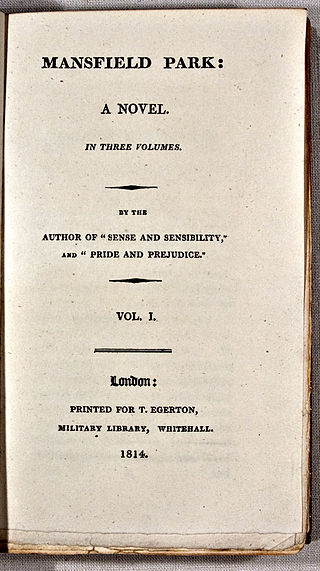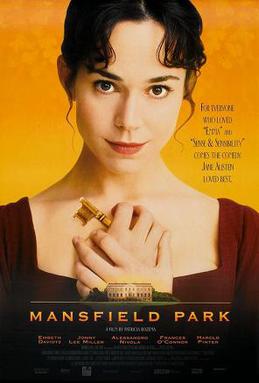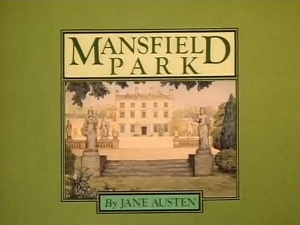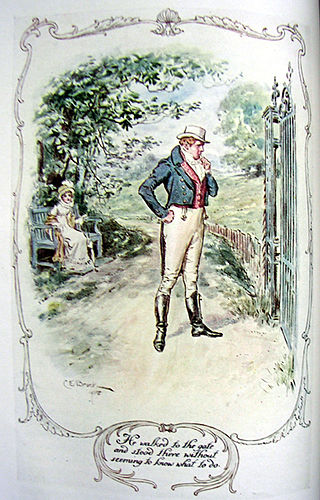| Tom Bertram | |
|---|---|
| Jane Austen, Mansfield Park character | |
| In-universe information | |
| Full name | Tom Bertram |
| Family | Sir Thomas Bertram and Lady Maria Bertram |
| Relatives | Edmund Bertram, Maria Bertram, and Julia Bertram |
| Home | Mansfield Park, but he often travels and stays with friends and acquaintances |
Tom Bertram is a supporting character in Jane Austen's 1814 novel, Mansfield Park . He is the elder son and heir of Sir Thomas Bertram, a baronet and wealthy landowner in Northamptonshire, who also owns an estate in Antigua.
As a seventeen-year-old, Tom Bertram is not particularly kind to his cousin Fanny Price, the poor ward of his parents who has come to live with his family. Once grown up, he is depicted as a person who is only interested in amusing himself and is careless and extravagant with money.
Austen's writing is influenced by many sources. Tom's character has much in common with the biblical Prodigal, though he is the elder rather than younger son, and the portion of inheritance he wastes is not his own but his brother's. [1] Barbara Hayley says that Tom's vices spring from being the elder brother and heir, and 'that without effort or worth on his part, the family's house, estate and money are destined for him'. [2] Sir Thomas has to sell the living of the local parish to pay off Tom's debts. This harms the prospects of his younger brother Edmund, who intends to become a clergyman and would be expecting an income from the tithes of the parish. Edmund never expresses any resentment.
Tom expresses 'repentance' on two occasions. Sir Thomas rightly suspects the first repentance to be superficial and removes Tom from the influence of his friends by taking him on a business trip to Antigua for a year. Tom's removal is also beneficial to the estate since the more reliable Edmund attends to its management.
The second repentance comes near the end of the novel when Tom has a 'fall', both literal and spiritual, at the Newmarket Easter races and, being close to death, sends word to bring him home. Edmund is the one to bring him back. On both occasions of repentance, Sir Thomas is a welcoming father, an attitude not extended to the adulterous Maria, though Maria never wants to return home.
Tom is good at entertaining, but only after his second repentance does he begin to develop a sense of responsibility. Paula Byrne describes Tom as one of the most intriguing characters in Austen's fictional world. He loves theatre and dressing up and is very close to the dandyish Yates. He is not very good at understanding women and the social customs of courtship, and there is no indication that he ever marries. She suggests that If there is a homosexual character in any of Austen's novels, then it is Tom Bertram. [3]
Tom and his father go to Antigua to deal with problems on his estate. After a year, Tom is sent back home and returns to his former friends and his travels around the country. Two wealthy young people, Henry and Mary Crawford move into the area and are living in the parsonage with their half sister, Mrs Grant wife of the new clergyman. Mary is tentatively romantically interested in Tom but he does not respond to her; she shifts her attentions to his younger brother, Edmund.
Tom leaves home again to spend time with his friends at Weymouth. Weymouth had become one of the first modern tourist destinations and had been made popular by the royal family and their hangers-on. It had a reputation as a raffish seaside resort and is the offstage backdrop for Tom Bertram's disastrous meeting with John Yates, who later elopes with Tom's sister, Julia. [4]
When Tom returns to Mansfield Park, he is soon joined by Mr Yates. They want to put on an amateur production of a play that is somewhat risque. Edmund and Fanny are opposed but the rest of the group are excited. Tom arranges for a theatre to be built in the billiard room. Austen carefully distinguishes between the fashionable elite theatricals of the aristocracy, which were mercilessly lampooned by the press, and the more modest efforts of the gentry. [3] Georgian debates about whether amateur acting was a virtuous activity or its opposite were lively, and Austen uses this to create the drama. An enthusiastic theatre-goer, she displays accurate knowledge of how acting companies really worked. Tom Bertram is both actor and company manager, as was the case on the professional stage. [5]
The play is almost ready for production when Sir Thomas returns unexpectedly early and puts a stop to the proceedings. Barbara Hayley points out that while Tom shows considerable force of character in instigating and carrying through his plans and overcoming Edmund's objections, he never shows any sign of helping his father with either estate or business. [2]
Josephine Ross says that Austen's experience of hearing her brothers declaim poetry must be reflected in Tom Bertram's reminiscence, 'I am sure my name was Norval, every evening of my life, through one Christmas holidays', a reference to his childhood recitations from the popular eighteenth-century play Douglas, by John Home. [6]
Later in the novel, Tom leaves again to take part in a horse racing meet at Newmarket but has a fall and is injured which, combined with his drinking, causes him to become very ill. His friends abandon him and Edmund has to fetch him home to be nursed back to health. His illness causes his family to fear for his life. This is observed with interest by Mary Crawford, who wants to marry Edmund. If Tom should die, that would leave Edmund as the heir to the Bertram estates and title. During his illness, Tom learns to suffer and to think and develops into a more prudent man. Barbara Hayley points out that we never see this improvement at first hand and 'it is not at all like the Tom we know'. [2]

Jane Austen was an English novelist known primarily for her six novels, which implicitly interpret, critique, and comment upon the British landed gentry at the end of the 18th century. Austen's plots often explore the dependence of women on marriage for the pursuit of favourable social standing and economic security. Her works are an implicit critique of the novels of sensibility of the second half of the 18th century and are part of the transition to 19th-century literary realism. Her deft use of social commentary, realism and biting irony have earned her acclaim among critics and scholars.

Sense and Sensibility is a novel by Jane Austen, published in 1811. It was published anonymously; By A Lady appears on the title page where the author's name might have been. It tells the story of the Dashwood sisters, Elinor and Marianne as they come of age. They have an older half-brother, John, and a younger sister, Margaret.

Emma is a novel written by Jane Austen. It is set in the fictional country village of Highbury and the surrounding estates of Hartfield, Randalls and Donwell Abbey, and involves the relationships among people from a small number of families. The novel was first published in December 1815, with its title page listing a publication date of 1816. As in her other novels, Austen explores the concerns and difficulties of genteel women living in Georgian–Regency England. Emma is a comedy of manners.

Persuasion is the last novel completed by Jane Austen. It was published on December 20, 1817, along with Northanger Abbey, six months after her death, although the title page is dated 1818.

Mansfield Park is the third published novel by Jane Austen, first published in 1814 by Thomas Egerton. A second edition was published in 1816 by John Murray, still within Austen's lifetime. The novel did not receive any public reviews until 1821.

Mansfield Park is a 1999 British romantic comedy-drama film based on Jane Austen's 1814 novel of the same name, written and directed by Patricia Rozema. The film departs from the original novel in several respects. For example, the life of Jane Austen is incorporated into the film, as are the issues of slavery and West Indian plantations. The majority of the film was filmed on location at Kirby Hall in Northamptonshire.

Mansfield Park is a 1983 British television drama serial, made by the BBC, and adapted from Jane Austen's 1814 novel of the same name. The serial was the first screen adaptation of the novel. Unlike Patricia Rozema's 1999 film, it is faithful to Jane Austen's novel. Jonny Lee Miller, who has a small role as Charles Price in this serial, played Edmund Bertram in Rozema's adaptation.

Mansfield Park is a 2007 British television film directed by Iain B. MacDonald and starring Billie Piper, Michelle Ryan, and Blake Ritson. Adapted from Jane Austen's classic 1814 novel of the same name, the film is about Fanny Price, who is sent by her poor mother to live with wealthy relatives at their Mansfield estate. By the age of eighteen, Fanny is in love with her sensitive cousin who is studying to be a clergyman. Her feelings for him and her moral sense prevent her from accepting a marriage proposal from a much wealthier suitor.

The reception history of Jane Austen follows a path from modest fame to wild popularity. Jane Austen (1775–1817), the author of such works as Pride and Prejudice (1813) and Emma (1815), has become one of the best-known and most widely read novelists in the English language. Her novels are the subject of intense scholarly study and the centre of a diverse fan culture.

Frances "Fanny" Price is the heroine in Jane Austen's 1814 novel, Mansfield Park. The novel begins when Fanny's overburdened, impoverished family—where she is both the second-born and the eldest daughter out of 10 children—sends her at the age of ten to live in the household of her wealthy uncle, Sir Thomas Bertram, and his family at Mansfield Park. The novel follows her growth and development, concluding in early adulthood.
Henry Crawford is one of the main characters in Jane Austen's 1814 novel, Mansfield Park. He is depicted as a man who, though not conventionally handsome, has great charisma. He is lively, witty and charming, a great asset at dinner parties, and admired by nearly all. Henry and his sister bring a fresh energy to the rather dour and oppressive atmosphere of Mansfield Park. At Sotherton his potential for disruption begins to emerge.

Edmund Bertram is a lead character in Jane Austen's 1814 novel Mansfield Park. He is Sir Thomas's second son and plans to be ordained as a clergyman. He falls in love with Mary Crawford who constantly challenges his vocation. Edmund goes ahead with ordination. At the end of the novel he marries Fanny Price.

Maria Bertram is a fictional character in Jane Austen's 1814 novel, Mansfield Park.
Mary Crawford is a major character in Jane Austen's 1814 novel, Mansfield Park. Mary is depicted as attractive, caring and charismatic. The reader is gradually shown, often through the eyes of Fanny Price, a hidden, darker side to Mary's personality. Her wit disguises her superficiality and her charisma disguises her self-centredness. Edmund Bertram, an earnest young man and destined for the clergy falls deeply in love with her. Only at the end of the novel does reality overcome his romantic fantasies and he leaves her with deep regret.
Jane Austen's (1775–1817) distinctive literary style relies on a combination of parody, burlesque, irony, free indirect speech and a degree of realism. She uses parody and burlesque for comic effect and to critique the portrayal of women in 18th-century sentimental and Gothic novels. Austen extends her critique by highlighting social hypocrisy through irony; she often creates an ironic tone through free indirect speech in which the thoughts and words of the characters mix with the voice of the narrator. The degree to which critics believe Austen's characters have psychological depth informs their views regarding her realism. While some scholars argue that Austen falls into a tradition of realism because of her finely executed portrayal of individual characters and her emphasis on "the everyday", others contend that her characters lack a depth of feeling compared with earlier works, and that this, combined with Austen's polemical tone, places her outside the realist tradition.

Georgian society in Jane Austen's novels is the ever-present background of her work, the world in which all her characters are set. Entirely situated during the reign of George III, the novels of Jane Austen describe their characters' everyday lives, joys, sorrows, and loves, providing insight into the period.
Mansfield Park is a 2011 chamber opera in two acts by Jonathan Dove with a libretto by Alasdair Middleton based on the 1814 novel by Jane Austen. Initially composed for four handed piano, it has been set to music for 13 piece orchestral ensemble. It tells the story of poor relation Fanny Price, sent at age 10 to live with her uncle, Sir Thomas Bertram, at his family estate, Mansfield Park.

Mr. James Rushworth is a character from Jane Austen's 1814 novel Mansfield Park. Mansfield Park is about a young girl, Fanny Price, who goes to live with her wealthy relatives, the Bertrams. The novel follows the familial life and social circle of the Bertrams. Rushworth is part of this circle. He is the son of Mrs. Rushworth and has inherited Sotherton Estate. He has 12,000 pounds a year, which makes him a very eligible bachelor. He is the fiance of Maria Bertram who is the eldest daughter of Sir Thomas Bertram. His dull-witted character is in parallel to another 'Austen' character, Mr William Collins, from Pride and Prejudice.

The Real Jane Austen: A Life in Small Things is a biography of novelist Jane Austen by the writer Paula Byrne first published in 2013. The biography does not follow her life chronologically; rather her story is told around events or objects in Austen's life as the starting point to describe the famous English author.
Old Friends and New Fancies: An Imaginary Sequel to the Novels of Jane Austen (1913) is a novel by Sybil G. Brinton that is often acknowledged to be the first sequel to the works of Jane Austen and as such is possibly the first piece of published Austen fan fiction, although earlier examples have been described by Sarah Glosson. It incorporates characters from each of Austen's six major novels into one unified story, alongside characters of Brinton's own invention. Keeping to the spirit of the source novels, its major theme is the difficulties faced by assorted pairs of lovers placed within the class structure of early 19th century Britain.